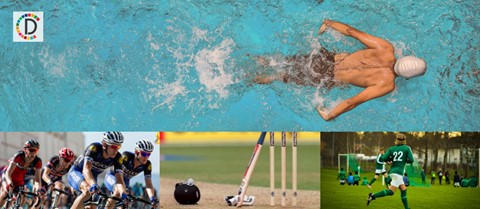We are in different planet, says Coe after introducing prize money in Olympics
We are in different planet, says Coe after introducing prize money in Olympics

- Country:
- India
World Athletics President Sebastian Coe on Wednesday said the introduction of prize money for its Olympic medallists was long overdue as the track and field athletes are the reason behind earning huge revenue in the quadrennial Summer Games, backing a decision that has the potential to cause tension with the IOC.
Coe, himself a double Olympic gold medallist, admitted that he had not discussed with the International Olympic Committee -- under whose aegis the Olympic Games are held -- before announcing the decision.
''I don't know, I have not discussed this with them (IOC),'' Coe told reporters in a virtual interaction attended by PTI, when asked if he discussed the matter with the International Olympic Committee prior to the announcement.
''My understanding is that our CEO (Jon Ridgeon) spoke to the games department, sports department (of the IOC) this morning ... and gave them a heads up on this announcement.
''I would be more involved with the announcement part and the conversation of that announcement and I left that (speaking to IOC) to Jon (CEO).'' In a first for an Olympic sport, gold-medallists in 48 athletics events of this year's Paris Games will be awarded USD 50,000 by World Athletics, which will widen the spectrum by giving prize money to all three medal winners at the 2028 Los Angeles edition.
Modern Olympics originated as an amateur sports event and the IOC does not award prize money, though many medallists receive huge payments from their countries' governments, national sports bodies or from sponsors.
The Indian Olympic Association (IOA) awarded Rs 75 lakh each to gold medal winners of the Tokyo Olympics, Rs 40 lakh and Rs 25 lakh to silver and bronze winners. Each participant was also given Rs 1 lakh.
Coe, who won his 1,500 metres gold medals at the 1980 and 1984 Olympics, rejected the idea that WA's new plan would undermine the amateur ethic of the Games.
''I'm probably the last generation to have been on the 75 pence meal voucher and a second class rail ticket, competing for my own country,'' the 67-year-old said.
''I understand the nature of the transition we've been in. We are now operating in a completely different landscape and completely different planet from when I was competing.
''So, it is important that the sport recognises that change in that landscape and the added pressures on many competitors. I have always said that I wanted the athletes to benefit from the proceeds of growth.'' Coe also asserted that the WA took a decision which was well within its ambit.
''This an issue for our sport. The IOC has consistently recognised the primacy of international federations to determine and fashion their own future.
''I am hoping the IOC, given their commitment, their avowed commitment, to make sure that the athletes or the sports, the revenues raised through the Olympic Movement find their way back on to the frontline.
''I think they made the point that 89 per cent of that goes back... they would share in this principle.'' Asked again if the introduction of prize money was not in some way against the Olympic spirit of amateurism, he said, ''Introducing prize money for gold medallists acknowledges that the athletes are the reason.
''I make it very clear (that) athletics is the reason (why) billions of people have watched the Olympic Games, why events on track attract such high revenue.'' On whether he expects other sports to follow suit, Coe said, ''I don't know, that is really a matter for other individual sports. I always made it a point not to speak on behalf of other sports any more than I would want other sports be speaking on behalf of athletics.
''It is entirely a matter for them, that will be a judgment they will have to make.'' The IOC, which is yet to comment on the development, distributes revenues earned from the Olympics to the international federations. A total of USD 540 million was allocated to 28 sports at Tokyo Olympics, with World Athletics receiving the most at USD 40 million.
Giving away prize money is not new at the level of World Athletics Championships. Gold medallists at the 1993 World Championships in Stuttgart received Mercedes cars worth USD 30,000.
Gold medallists at last year's World Championships earned USD 70,000, only USD 10,000 more than when prize money was introduced in 1997.
(This story has not been edited by Devdiscourse staff and is auto-generated from a syndicated feed.)
ALSO READ
Asian Wrestling Championships 2024: Anju, Harshita shine with silver medal wins, Antim settles for bronze
Indian Greco-Roman wrestlers have forgettable day at Asian Championships
Sabalenka and Badosa set to battle in Stuttgart opener
Tennis-Sabalenka getting in the mood for clay in Stuttgart
Sports News Roundup: Oilers' Connor McDavid nabs 100th assist; Sabalenka getting in the mood for clay in Stuttgart and more










